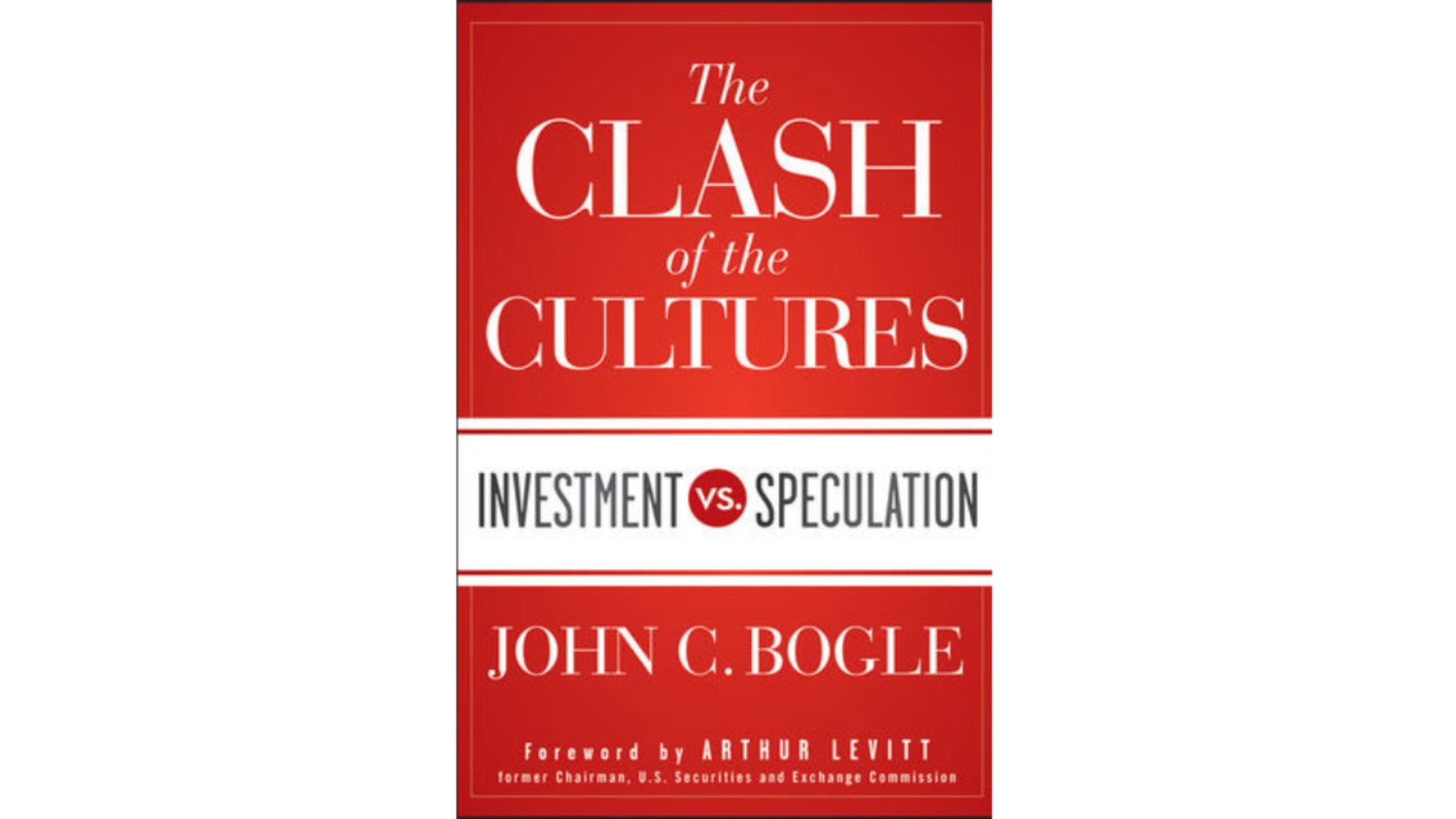John C. Bogle’s book “The Clash of the Cultures: Investment vs. Speculation” explores the underlying conflicts and difficulties that investors encounter in the contemporary financial sector. The book’s synopsis is as follows:
In his book “The Clash of the Cultures,” John C. Bogle, the creator of Vanguard Group, examines the conflict between the cultures of speculation and investing in the financial industry. According to Bogle, the speculative culture, which puts more emphasis on short-term gains and reckless risk-taking, is eclipsing the investing culture, which prioritizes long-term wealth creation and responsible risk-taking.
Bogle talks about how traders, speculators, and short-term investors now control the markets, with the financial sector becoming more and more centered on speculation. He draws attention to the drawbacks of this change, including increased market volatility, decreased transparency, and a separation between the financial industry and the real economy.
The book looks at how institutional investors like pension funds, mutual funds, and others play a part in the clash of cultures. According to Bogle, these significant institutional players should place a higher priority on upholding their fiduciary commitment to serve their clients’ best interests by encouraging long-term investing and prudent capital management.
Bogle stresses the significance of coordinating the interests of shareholders, company executives, and society at large. He supports a return to the fundamentals of conservative, traditional investing, where firms and shareholders collaborate to produce long-term, sustainable wealth.
Bogle offers views and analyses on a variety of financial industry topics throughout the book, such as the development of index funds, the effects of high-frequency trading, and the necessity of increased shareholder participation.
Investors, financial experts, and governments should respond to “The Clash of the Cultures” by urging the financial sector to adopt a more ethical and sustainable approach to investment. Bogle’s message exhorts people to avoid succumbing to short-term speculation and excessive risk-taking and instead concentrate on long-term investing plans that put the interests of all stakeholders first.
The Book in 3 Sentences
1. Cultural Conflict: The book explores the conflict between the speculative culture, which emphasizes quick gains at the expense of excessive risk, and the investing culture, which is centered on long-term value creation and sensible risk-taking. It demonstrates how in the financial sector, speculation has eclipsed the investment mindset.
2. Negative repercussions include greater market volatility, decreased transparency, and a rift between the financial and real economies as a result of the trend toward speculation. The negative implications of this trend on investors and society at large are examined in the book.
3. Supporting Responsible Investing: John C. Bogle, the author, is a proponent of a return to conventional, conservative investing standards. He promotes long-term investing techniques and prudent capital management, highlighting the significance of bringing investors, corporate managers, and society’s interests into alignment.
Impressions
“The Clash of the Cultures: Investment vs. Speculation” by John C. Bogle leaves you with several common impressions. Here are some of the most notable impressions from the book:
1. Critique of Speculation: Perceive the book as a critical analysis of the prevailing culture of speculation in the financial industry. It highlights the negative consequences of excessive risk-taking, short-term focus, and the prioritization of immediate gains over long-term value creation.
2. Emphasis on Responsible Investing: One of the key impressions from the book is the emphasis on responsible investing. Bogle advocates for a return to prudent investment practices that prioritize the long-term interests of investors and the alignment of corporate actions with shareholder and societal well-being.
3. Call for Change and Reform: “The Clash of the Cultures” often leaves people with a sense of urgency and a call to reform the financial industry. Bogle’s message prompts individuals, investors, and policymakers to reconsider the prevailing speculative mindset and work towards a more sustainable and responsible approach to investing.
4. Fiduciary Duty and Investor Protection: The book highlights the importance of fiduciary duty and investor protection. People commonly recognize the need for financial professionals and institutional investors to prioritize the best interests of their clients, promote transparency, and act as responsible stewards of capital.
5. Insights on Index Funds: Bogle’s analysis of index funds and their potential benefits has resonated with readers. The book sheds light on the advantages of low-cost, passive investment strategies and their potential to outperform actively managed funds over the long term.
Overall, “The Clash of the Cultures” leaves readers with a critical perspective on the speculative nature of the financial industry, while emphasizing the importance of responsible investing, long-term value creation, and aligning the interests of investors and society.
How I Discovered It
“The Clash of the Cultures: Investment vs. Speculation” by John C. Bogle is discovered through various channels and sources. John C. Bogle, as the founder of Vanguard Group and a prominent figure in the investment world, has established a strong reputation. I had heard about his contributions to the investment community which is why I explored his insights further.
Who Should Read It?
“The Clash of the Cultures: Investment vs. Speculation” by John C. Bogle is a book that offers valuable insights and perspectives on the financial industry and investing. It is recommended for several groups of people:
1. Investors and Traders: Individuals who are actively involved in investing, whether as individual investors or professional traders, can benefit from reading this book. It provides a critical analysis of the prevailing speculative culture and offers insights into long-term value creation, responsible investing, and aligning investment decisions with shareholder interests.
2. Financial Professionals: Professionals working in the financial industry, including financial advisors, portfolio managers, and investment analysts, can gain valuable perspectives from “The Clash of the Cultures.” The book challenges prevailing practices and encourages a focus on prudent investment strategies that prioritize client interests and sustainable wealth creation.
3. Students and Researchers: Students pursuing studies in finance, economics, business, or related fields can find “The Clash of the Cultures” to be a valuable resource. It offers a critical examination of the financial industry and encourages deeper thinking about the role of speculation, long-term investing, and responsible financial management.
4. Individuals Interested in Personal Finance: Readers with a general interest in personal finance, wealth management, and building long-term financial security can benefit from the insights shared in the book. It guides prudent investing, the importance of aligning interests with financial advisors, and the potential pitfalls of short-term speculation.
Overall, “The Clash of the Cultures” is a relevant and informative read for individuals with an interest in finance, investing, and the dynamics of the financial industry. It offers insights and perspectives that can benefit a wide range of readers, from seasoned professionals to those starting their investment journey.
How the Book Changed Me
After reading “The Clash of the Cultures: Investment vs. Speculation” by John C. Bogle, individuals may experience various changes in their mindset, perspectives, and behaviors. Here are some ways I change after reading the book:
1. Shift in Investment Philosophy: I experienced a shift in my investment philosophy, moving away from short-term speculation and excessive risk-taking toward a more long-term, value-driven approach. I prioritized fundamental analysis, patient investing, and a focus on sustainable wealth creation over chasing immediate gains.
2. Heightened Awareness of Speculative Practices: The book raises awareness about the negative consequences of speculative practices in the financial industry. I became more mindful of the risks associated with short-term trading, excessive leverage, and speculative investment products. I sought to avoid and mitigate such practices in my investment strategies.
3. Emphasis on Responsible Investing: “The Clash of the Cultures” promotes responsible investing, which takes into account the interests of all stakeholders, including shareholders, society, and future generations. I developed a stronger sense of fiduciary duty and prioritize investments that align with my values, sustainable growth, and long-term financial well-being.
4. Greater Focus on Investment Education: The book inspired me to deepen my knowledge and understanding of investing. I became more proactive in seeking out investment education, staying updated on market trends, and honing my analytical skills. This increased knowledge empowered me to make more informed investment decisions.
5. More Discerning Approach to Financial Advisors: I became more discerning when selecting financial advisors or professionals to work with. I prioritized advisors who embrace a long-term, client-centric approach and demonstrate a commitment to prudent investing and transparent practices.
My Top Quotes
1. “In the long run, investing is not about markets at all. Investing is about enjoying the returns earned by businesses.”
2. “The triumph of speculation in modern finance has induced a shift in the culture of the investment community from one of stewardship to one of salesmanship.”
3. “Successful investing is about owning businesses, not trading stocks.”
4. “Short-term speculation is a loser’s game; long-term investment is a winner’s game.”
5. “The triumph of speculation is a stark reminder of the need for all investors to stay focused on the long term.”
6. “To reestablish a more rational culture, we need a revolution in investment management.”
7. “The relentless pursuit of trading profits, as distinct from the pursuit of investment returns, is the dominant reality of Wall Street today.”
8. “Index funds are the essence of long-term investing, of buying and holding a diversified portfolio of outstanding businesses at a minimal cost.”
Please note that these quotes are not sourced directly from the book and are intended to provide a general sense of the ideas conveyed in “The Clash of the Cultures.” For precise and accurate quotes, it is recommended to refer to the book itself.
Detailed Notes//Key Topics
“The Clash of the Cultures: Investment vs. Speculation” by John C. Bogle covers several key topics related to the financial industry and investing. Here are some of the prominent topics addressed in the book:
1. Investment vs. Speculation: The book explores the fundamental difference between the investment mindset, focused on long-term value creation and prudent risk-taking, and the speculative mindset, which prioritizes short-term gains and excessive risk. It delves into the consequences of the prevailing speculative culture and advocates for a return to responsible investing.
2. Fiduciary Duty and Investor Protection: Bogle emphasizes the importance of fiduciary duty in the financial industry. He discusses the need for financial professionals to act in the best interests of their clients and promote transparency, fair dealing, and investor protection. The book highlights the challenges posed by conflicts of interest and the impact on investors.
3. Long-Term Investing: The book champions the merits of long-term investing as a means of building wealth and creating sustainable value. Bogle provides insights into the benefits of patient investing, compound returns, and the potential drawbacks of short-term trading and market timing.
4. Speculative Practices and Excessive Risk: Bogle examines various speculative practices prevalent in the financial industry, such as short-term trading, high-frequency trading, and excessive leverage. He explores their impact on market volatility, investor confidence, and the stability of the financial system.
5. Index Funds and Passive Investing: The book discusses the rise of index funds and passive investing as a way to align investment strategies with long-term value creation and low costs. Bogle shares his perspectives on the benefits of index funds in achieving broad market exposure, diversification, and potential outperformance of actively managed funds.
6. Corporate Governance and Shareholder Activism: Bogle delves into the topic of corporate governance and the role of shareholders in holding companies accountable. He explores the importance of responsible stewardship, shareholder engagement, and aligning corporate actions with the long-term interests of shareholders.
7. The Role of Culture in the Financial Industry: The book examines the cultural dynamics within the financial industry and how they shape investment decisions and practices. Bogle highlights the need for a cultural shift that prioritizes the long-term interests of investors and society over short-term speculation and excessive risk-taking.
These key topics provide a glimpse into the themes explored in “The Clash of the Cultures.” The book aims to provoke thoughtful reflection and discussion on the nature of investing, the role of speculation, and the need for a more responsible and sustainable approach to finance.

